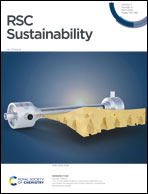A biomass hydrogel solar evaporator based on low-grade tobacco leaves for water evaporation and thermoelectric conversion applications†
Abstract
Interfacial solar-driven evaporation technology has attracted widespread attention. The core technology of photothermal conversion is photothermal materials and biomass photothermal materials are characterized by low cost, large specific surface area, environmental friendliness, and renewability. Low-grade tobacco leaves (LTLs) are harmful to the environment; however, they also have good recycling potential. In this work, a high-performance, low cost, and environmentally friendly solar steam generation material was fabricated by combining polyvinyl alcohol hydrogels and biomass photothermal material LTL. The photothermal conversion efficiency can reach 14.33% for LTL under sunlight irradiation, and the evaporation rate reached 1.07 kg m−2 h−1 with an evaporation efficiency of 74.3%. The waste heat generated during solar water evaporation can be effectively used for synergistic water-electricity cogeneration, thus achieving an evaporation rate and voltage of 0.83 kg m−2 h−1 and 38.7 mV under sunlight irradiation, respectively. This work enhances the prospects for the comprehensive utilization of biomass resources and provides effective application methods for the development of seawater desalination technology.



 Please wait while we load your content...
Please wait while we load your content...